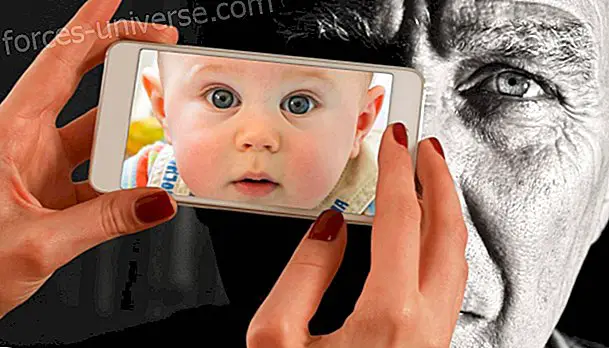
“ The Unconscious has no time. There are no problems about Time in it. Part of our Psyche is not in time or space. These are just an illusion, Time and Space, and so in a certain part of our Psyche, time does not count at all. "
- Carl Gustav Jung
Time, our great ally when it comes to overcoming pain and our great executioner when looking at us in the mirror. It is said that time is a creation of the human being, who uses it to organize his memories in a more efficient way. However, we all agree that, creation or not, it plays a fundamental role in our lives.
The perception of time has always been one of the great mysteries of science, not solved until today. While great advances have been made in this area, it has not yet been determined with certainty how we measure time.
There are many theories that try to explain the perception of time and the fluctuation of its dynamism. But all agree on one point, and we cannot take into account a single concept of time . In fact, each of us can recognize at least two, one real that is exercised over all the phenomena of the universe, and another subjective. This second is the one that is closely related to the way we perceive the passage of time, and hence how it affects us in our daily lives.
Time heals, but it can also be cruel . What does this categorization of time depend on?
We will discuss in the following article some of the essential points to understand the perception of time .
Subjective time
I imagine that you will know from experience that time flies when you have fun . I also imagine that you will have experienced the slowness of it when you are in the dentist's waiting room. However, you still believe that time in both cases, time is the same .
Well, these are clear examples of how we have the ability to alter our perception of time according to different determinants of our different experiences.
This is subjective time, the result of our distorted perception of the duration of events. It is then this time is a distortion that belongs to us . Now, what influences us to make our perception of time a reality so close to us?
Well, to begin with, we must understand that our task of interpreting durations influences more than one system. We could say that there are several clocks acting on us, each responsible for a certain portion of the global process.

Internal clocks
Within this list is our Circadian Cycle, which is responsible for determining the different biological stages within the duration of a day. This is the one that separates the hours of ingestion from the hours of digestion and those of sleep, and the different physiological activities that will be carried out in each one are programmed. And this is the main affected by the phenomenon known as " Jet Lag ".
We can also name a system for capturing short intervals, who interprets with high precision fast events that unfold in milliseconds. It is the one that allows us to interpret the different phonemes during a conversation, or to cut a ball in the air. Our movements and rhythm perception depend heavily on this clock.
However, the main process that becomes our perception of time is what we could call Cognitive Clock .
The Cognitive Clock is in charge of our experience of the passage of time, whose relevant minimum intervals are given in seconds and minutes. However, there are a large number of factors that influence the way you interpret time . This makes it sensitive to being altered very easily, and that is why it is incredibly flexible.
This, depending on the result, can be an advantage or a disadvantage . Then, the perception of time is the result of several cognitive processes that participate and influence together.
According to Douwe Draaisma, the prestigious Dutch psychologist, the effect we perceive over time results from the repetition of past experiences . This means that as life progresses, the situations we are experiencing are completely or partially a repetition of something we already live. The brain gives less importance to a repetitive experience and therefore retains it in less quantity. We begin that way to save fractional memories of the events that happen.
Our emotions and the perception of time
But this theory, even if correct, is at least incomplete . As there is an alteration of our perception of time based also on our mood swings. Basic emotions such as fear or anger produce fluctuations in the duration in which we perceive events. To a person with a chronic panic, an oral exam will seem like an eternal suffering, beyond that for the teacher it will be only a matter of minutes.
Also the stress accelerates our internal clock, which produces the feeling that time is running slower. This also occurs under the influence of stimulants, such as coffee. On the contrary, nervous system depressant drugs such as alcohol slow down our internal clock . The result is that we perceive that time is moving faster.
If one sets his attention and is aware of the passage of time, he will have the feeling that he is not advancing. It is what happens when we are constantly looking at the clock and it always returns the same face .
Our mood also directly influences the way we perceive the progress of time.
Until the day of the date, it has not been found with a specific body that is responsible for processing the subjective time . What happens is rather an estimate of duration influenced by everything we have named and more.

Developing the perception of time
I make all these observations to try to shape the true value that the perception of time has in our lives. And it turns out that being aware of the factors that influence and minimize them is essential for our health.
Our well-being will result from how efficient we are to manage our subjective time, taking into account the role that our emotions play in it.
Many times we want time to move faster, other times we want it to stop. But it is not our desire that influences the perception of time, but among other things, our inner state.
It is said that as we get older our processes in the nervous system are getting slower, and that is why we have the feeling that time is moving faster with the years. Even so, that is also a mere perception .
We cannot control time, and it is normal for its dynamism to be chaotic. Think about it, your mood swings, your attention, age, memory, feelings, experiences, etc. influence it.
The perception of time and emotions also have a symbiotic relationship. How we experience the passage of time will influence our emotional state, in the same way that our feelings will make it move faster or slower.
No one can escape time. But we can change the way it affects us, and from there learn to take advantage of it more efficiently.
Our well-being depends on it.
AUTHOR: Lucas, editor of the great family of HermandaBlanca.org
SOURCES:
- https://hipertextual.com/2017/03/percepcion-del-paso-del-tiempo
- https://www.investigacionyciencia.es/blogs/psicologia-y-neurociencia/37/posts/la-percepcin-del-tiempo-12083
- https://psicologia.laguia2000.com/psicologia-y-neurociencia/la-percepcion-del-teimpo
- http://www.cienciacognitiva.org/?p=653






